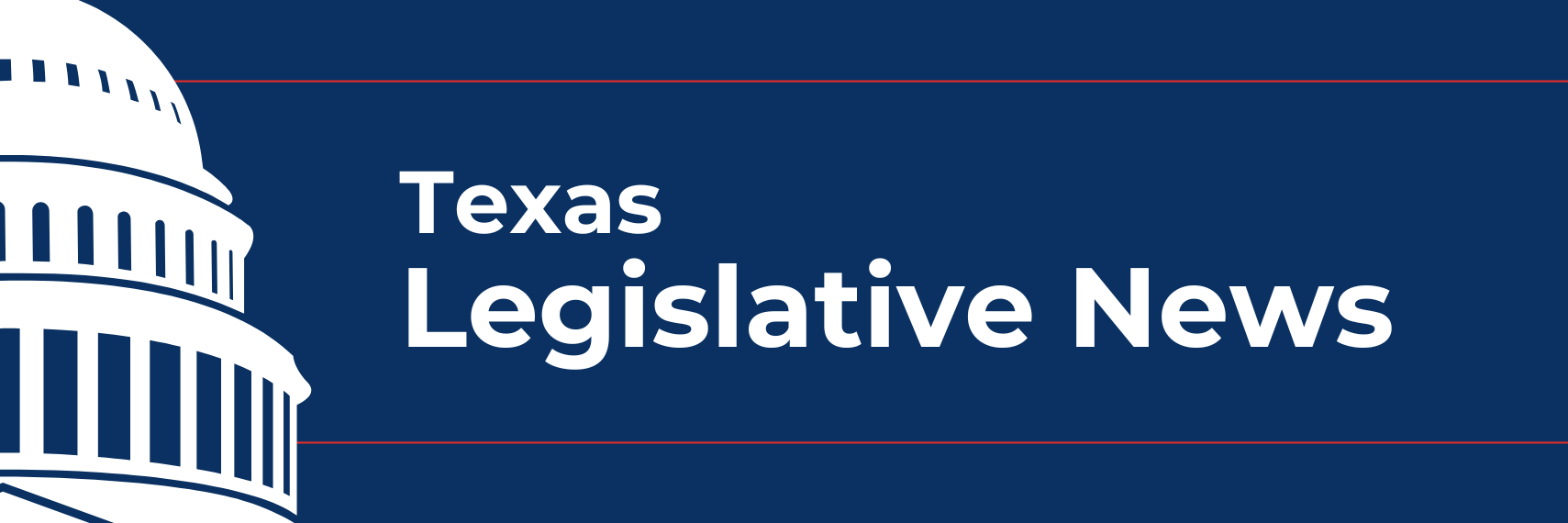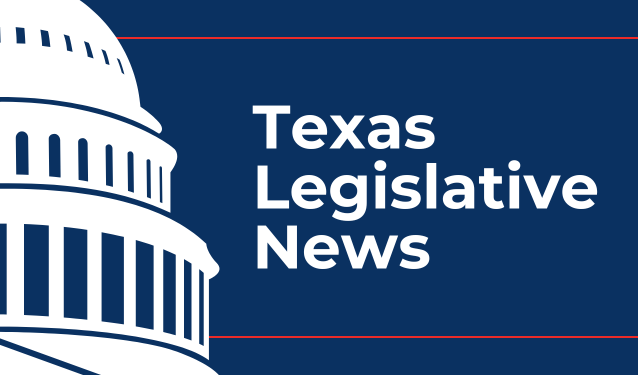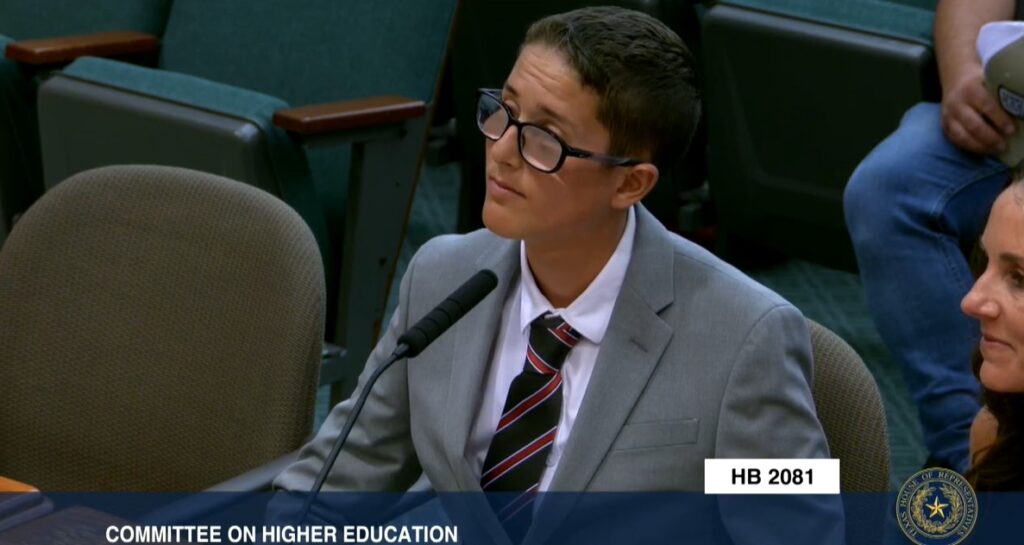

Table of Contents
Welcome to the latest edition of Texas Legislative News for the 89th Texas Legislature. In this regular feature, we provide information on disability-related issues and bills under consideration at the State Capitol. We also explain how lawmakers conduct business, and we share details on upcoming TCDD events.
TCDD Public Testimony
Last week, TCDD staff provided public comment on the following bills at the Capitol.
Crisis Service Centers
TCDD Senior Public Policy Analyst Linda Logan provided written remarks on April 14 to the Senate Committee on State Affairs regarding Senate Bill (SB) 2487. The bill would require large Texas counties to establish facilities for crisis intervention and mental health services as well as specialized services for people experiencing homelessness. Logan complimented the bill’s goals and recommended the committee add language to SB 2487 to ensure the needs of people dually diagnosed with mental health conditions and developmental disabilities (DD) are taken into account when creating new crisis service centers.
Child Care Training Standards
TCDD Senior Public Policy Analyst Lauren Gerken provided testimony on April 15 to the House Committee on Human Services. She spoke on House Bill (HB) 4665, which would update the training standards for child care providers by adding Texas school districts and the Texas Education Agency to the list of entities that can provide the training. Gerken shared details on TCDD’s engagement with community partners involved in child care. She also offered a recommendation that would have meaningful impact.
Existing Texas law requires a child care provider’s training to be appropriately targeted and relevant to the age of the children under the provider’s care. Gerken said HB 4665 should be updated to indicate that the training should be targeted to a child’s age or developmental stage, since “many children with disabilities, diagnosed and undiagnosed, experience developmental delays that do not align with their chronological age.”
“Incorporating developmental stage into code would represent significant progress, as it would acknowledge developmental delays exist, that children with them are worthy of expertly trained care, and it would broaden training options still required by code that appropriately address the needs of providers and the children they serve,” Gerken said.
Building Better Futures Program
On April 15, the House Committee on Higher Education took public comment on HB 2081. The bill would establish the Building Better Futures Program to facilitate educational and occupational skills training opportunities and support services for students with DD at public and private higher education institutions. Among those providing testimony was Kason Erwin, a high school senior with DD. Erwin was recently a youth ambassador in TCDD’s Center on Youth Voice, Youth Choice program. The initiative supported young adults with DD through training and mentorship on alternatives to guardianship.
Speaking in favor of HB 2081, Erwin described his recent experience visiting 12 universities across the country that offer inclusive postsecondary programs and his decision to enroll in the EMPOWER (Educate, Motivate, Prepare, Opportunity, Workplace Readiness, Employment, Responsibility) program at the University of Arkansas.
“I would have loved to stay in Texas close to my family and my roots,” Erwin said. “But the limited numbers of inclusive postsecondary [programs] here made that hard.”
Erwin said that HB 2081 would give students like himself more options in Texas and provide “more hope for students with intellectual disabilities who want to go to college, live independently, earn gainful employment and contribute to their communities.”

Kason Erwin, a high school senior with DD and a TCDD youth ambassador, testifies on April 15 to the House Committee on Higher Education regarding HB 2081.
If you’d like to give remarks at an upcoming hearing but aren’t sure how to craft your comments, we’ve created a My Testimony Blueprint (PDF) that can be used as a framework. For more support, check out our Legislative Advocacy Resources.
House Passes Education Bills
Last week, the Texas House passed three major bills related to education.
School Discipline and Classroom Management
On April 15, the House passed HB 6, which proposes broad reforms to school discipline policy and aims to strengthen classroom management and educator authority. HB 6 now moves to the Senate for consideration.
Since the bill’s introduction, disability advocates raised serious concerns (PDF) that HB 6 could have disproportionately negative impacts on students with disabilities. Those concerns still remain, but advocates cheered the floor adoption of an amendment that:
- requires threat assessment teams to include professionals familiar with a student’s disability;
- ensures the continued delivery of individualized education programs or 504 services in alternative placements; and
- mandates judicial oversight for removals, including input from the student’s admission, review, and dismissal (ARD) committee or 504 team.
Another amendment, which was supported by disability advocates but not adopted by the House, would have required an ARD committee meeting before major disciplinary actions.
Public School Finance
On April 16, the House passed HB 2 with broad bipartisan support. The bill devotes an additional $8 billion to public education. It also raises the basic allotment and directs 40% of that increase toward teacher and staff salaries while offering incentives to address teacher shortages. HB 2 now moves to the Senate for consideration.
For students with disabilities, HB 2:
- adds $615 million in annual special education funding;
- introduces a $1,000 allotment for each full individual evaluation; and
- expands funding for transportation and pre-K eligibility.
HB 2 also includes a $1,500 parent-directed services grant and strengthens support for students with dyslexia and those who are deaf or hard of hearing through early language acquisition assessments.
House members didn’t adopt many amendments to HB 2. But the House did approve an amendment to help fund full-day pre-k programs with dollars previously earmarked for compensatory education. The House also approved an amendment to have school districts provide information related to local intellectual and developmental disability authorities and Medicaid waiver programs.
Private School Vouchers
April 16 also saw the House approve SB 2, which would establish a statewide program of education savings accounts (ESAs), or private school vouchers. Disability advocates have expressed strong concerns over such a program. You can learn more about these concerns in our Private School Vouchers and Students with Disabilities one-pager (PDF).
Supporters of the bill largely shrugged off those concerns, arguing that SB 2 provides a valuable new opportunity for families of students with disabilities. The Senate adopted an amendment to require reporting on the dropout, expulsion, and graduation rates of ESA participants who are students with disabilities. But other amendments failed, including ones that would have required private schools in the ESA program to comply with federal disability laws and would ensure appropriate accommodations and protections for students with disabilities.
The Senate is expected to comply with the House’s amendments to SB 2. If so, the bill will soon move to the governor for signature into law.
Five Hearings To Watch
The following section includes a sample of legislative hearings we’re monitoring this week. During these hearings, legislative committees may consider important disability-related issues. You can find live and archived broadcasts of committee hearings on the House and Senate websites. A full list of upcoming hearings can be found on the Capitol website.
The House Committee on Public Health held a hearing (PDF) on Monday afternoon, April 21. The committee discussed a variety of bills, including:
- HB 1621 by Rep. John Lujan, relating to a matching grant program for technological enhancements at hospitals providing mental health care services.
- HB 1747 by Rep. Liz Campos, relating to funding for the coordination of mental health, substance use, and public health care services.
- HB 2264 by Rep. Alan Schoolcraft, relating to information provided by friends and family for certain patients’ medical records and to health care professionals’ duties when discharging certain patients from inpatient care.
- HB 2284 by Rep. Ann Johnson, relating to the licensing and regulation of music therapists.
The Senate Committee on Criminal Justice held a hearing (PDF) on Tuesday morning, April 22. The committee heard testimony on a variety of bills, including:
- SB 2693 by Sen. Charles Perry, relating to the role of advocacy and support groups in the juvenile justice system.
The House Committee on Human Services held a hearing (PDF) on Tuesday morning, April 22. The committee heard testimony on a variety of bills, including:
- HB 426 by Rep. Diego Bernal, relating to Medicaid and child health plan program coverage and reimbursement for childhood cranial remolding orthosis.
- HB 1941 by Rep. Liz Campos, relating to peer support specialists for certain people with DD and peer services for those individuals under Medicaid. HB 1941 was previously featured as a TCDD Bill of the Week. We’ve also created a one-pager with details on TCDD-funded peer support projects (PDF).
The House Committee on Transportation held a hearing (PDF) on Tuesday morning, April 22. The committee heard testimony on a variety of bills, including:
- HB 3947 by Rep. Yvonne Davis, relating to transportation planning by metropolitan planning organizations.
The House Committee on Homeland Security, Public Safety, and Veterans Affairs will hold a hearing (PDF) on Wednesday morning, April 23. The committee will hear testimony on a variety of bills, including:
- HB 1455 by Rep. Jolanda Jones, relating to the collection and reporting of information regarding mental health jail diversion.
Stay Informed
Throughout the 89th Texas legislative session, you can stay up to date on how lawmakers address disability issues by following us on Facebook, X, Instagram, and LinkedIn. You can also check out our Policy section to learn more about our legislative engagement and find resources to support your own advocacy.
